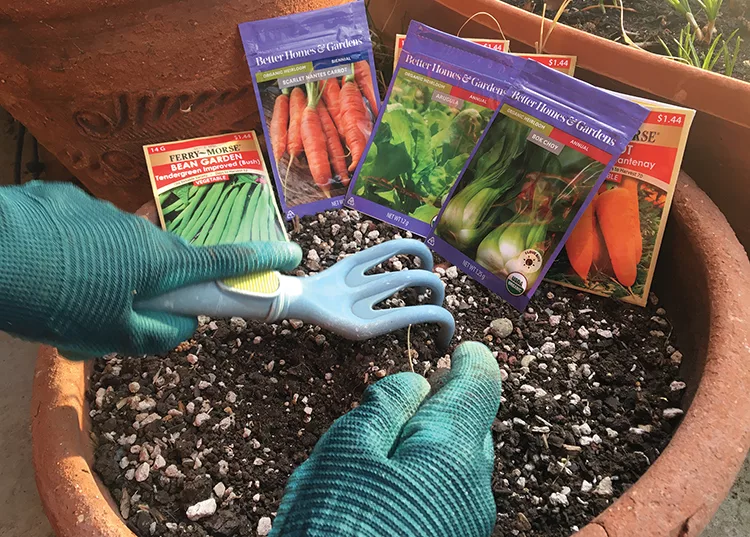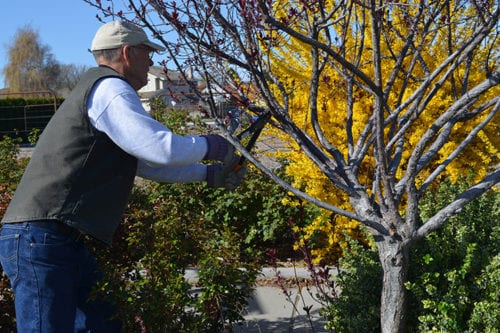
Home » Staying at home? Why not plant a garden?
Staying at home? Why not plant a garden?

April 10, 2020
Royceann Taft knows there’s solace to be found in the
garden.
The Master Gardener who lives in Kennewick said anyone can
tap into it, especially in times of isolation or stress.
“I have seen research that says that being out in the soil
and sun is very, very good for your immune system. Not just your mental health,
but your physical health, too. It makes sense to me that being outside and the
mental part—you know you’re doing something to help yourself and your family,”
Taft said.
It’s a theme reminiscent of the victory gardens of World War
I and II.
Americans were encouraged to plant them during the war years
to ensure an adequate food supply for civilians and troops. The nationwide
effort turned front yards, backyards, schoolyards and vacant lots into
vegetable gardens. In 1943, First Lady Eleanor Roosevelt had a victory garden
planted on the front lawn of the White House—one of the millions planted that
year, according to Smithsonian Libraries.
So maybe it’s time to consider planting a COVID-19 garden at
your home. After all, spring has arrived and the mild weather beckons despite
state mandates to remain home to prevent the spread of the coronavirus.
“We feel like we’re trapped a little bit. This is one way to
work through that and try to do something to offset all the other things. It’s
a good place to take out any aggression or anger. You can definitely work it
out if you’re building a garden,” said Taft, a Master Gardener since 2015.

Master Gardeners are community educators trained to work in
partnership with Washington State University Extension to educate the public
and promote science-based gardening practices. They also provide gardening
advice at plant clinics, demonstration gardens and other outreach activities.
Taft’s aunts were Master Gardeners in Oregon when the
program first started. The semi-retired teacher decided the program would be a
good fit for her as well because it combines her love of nurturing growth,
whether it be in humans or tender green shoots.
“I’ve always enjoyed that with my students—seeing their
growth,” she said. “I love to watch little seeds pop up and taking care of
them. I find it really, really enjoyable. I like being outside in the sun. And
I’m not good at sitting still. Even as child, I struggled with that in school.
I have to be doing something. I really, really enjoy just trying to grow my own
food as much as I can. I know where it comes from, the conditions it’s grown
in, and it’s more healthy.”
Taft, 52, taught elementary and middle school for 28 years,
mostly in Hermiston, but also in Pasco.
In February, she taught a Gardening 101 class in Kennewick
to a packed house of about 70 or so attendees, she said.
At the end of March, Taft was busy preparing her home
garden. “We bought a new piece of property and I’m starting to clear sod and
put in raised beds. … I am figuring out where things are going to go,” she
said.
Taft grew up on a remote ranch in Roseburg, Oregon.
“We had victory gardens on steroids. We grew almost everything
for an entire year on our property. We had massive gardens growing up,” she
said, admitting she didn’t have her first takeout food until she went away to
college.
It isn’t difficult to start up a small garden on your own,
she said.
If planning a patio garden, find seeds that specify the
plants are well suited to containers, she recommended. She said this ensures
compact-growing plants that thrive in smaller spaces.
“You can grow pretty much anything you want in containers.
It really depends on what you want to do,” she said.
“Herb gardens are great if you only use them for cooking:
rosemary, basil. They’ll stay small depending on the size of container. Those
are always nice to have.”
Taft said to place gardens or containers near the house so
they’re visible and it’s easier to remember to care for them.
“A lot of people are starting to put raised boxes in their
front yard for this reason,” she said. “If the garden is out front, you’re out
front, which is a good way to meet neighbors. People always stop by and ask
about what you’re growing. It actually builds community.”
Having access to water so hoses don’t need to be dragged
around and a southern exposure for a full amount of sun also are important
considerations, she said.
Cool season plants like peas and lettuces may be started
outside in April.
“Your warm season crops—peppers, tomatoes, summer
squash—those should be out after our last freeze. I would not put them out
until first part of May unless you have some way to protect those plants. Last
year we had freeze at end of April,” Taft said.
Taft said a lot of nurseries will deliver soil or compost to
your driveway. They can be ordered on the phone and then delivered, all without
having to leave the house, she said.
Early spring also is a fantastic time to research gardening
options, Taft said.
Check out the free literature on gardening at Gardening.wsu.edu. Click on “Vegetable gardens” on the left to learn about how to grow anything from carrots and cucumbers, to green peas and beans, to radishes and tomatoes. There are also resources for flower beds, fruits, lawns, trees, shrubs and pest management.
If you have questions for Master Gardeners, submit them
online at www.extension.wsu.edu/benton-franklin. Click on “Gardening, then click on “Ask a Master Gardener.”
Local News
KEYWORDS april 2020





